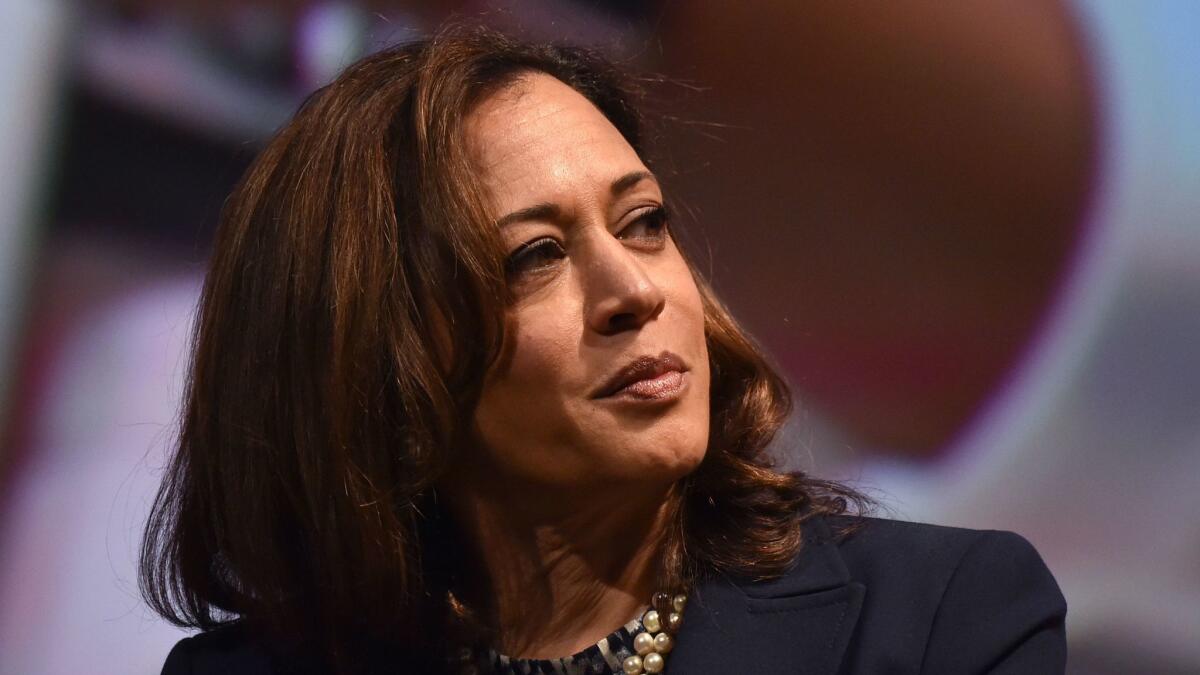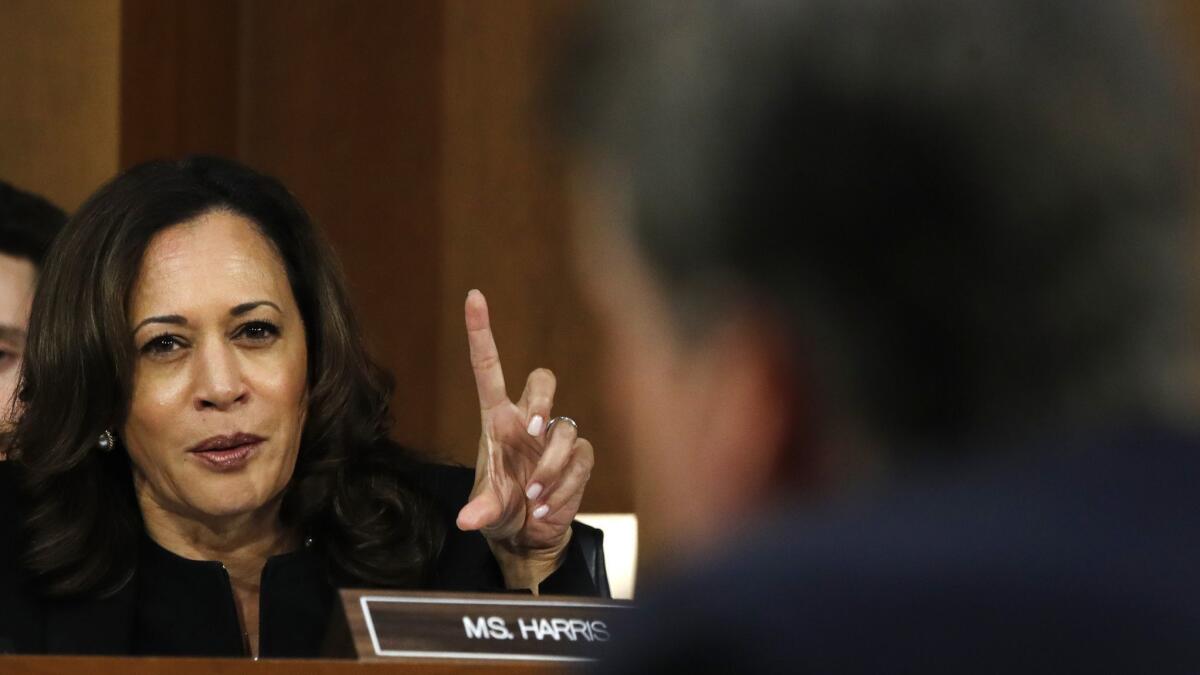Kamala Harris jumps into presidential campaign as first-tier candidate

- Share via
Kamala Harris, a first-term Democratic senator from California who captured national attention for her prosecutorial grilling of Trump administration officials, entered the 2020 presidential fray on Monday, casting her candidacy as a campaign to preserve American ideals.
Stressing her experience as a prosecutor, Harris drew a clear contrast with President Trump, without mentioning his name.
“The American people deserve to have somebody who is going to fight for them, who is going to see them, who will hear them, who will care about them, who will be concerned about their experience and will put them in front of self-interest,” she said as she made her announcement on ABC’s “Good Morning America.”
She also released a corresponding online video laying out her opening pitch.
“The future of our country depends on you and millions of others raising their voices to fight for our American values,” Harris said in the video. “That’s why I’m running for president of the United States. To lift those voices. To bring our voices together.”
Though Trump also went unmentioned in the video, the premise — that values such as decency and justice are “all on the line now” — was an implicit jab at him.
Harris, 54, is the fourth female member of Congress to dive into the increasingly crowded Democratic presidential primary field and the first woman of color to be a top-tier candidate. She launches her campaign in the same week that Shirley Chisholm, the first African American woman to run for president, started her bid 47 years ago.
The Oakland-born child of a Jamaican father and an Indian mother, Harris straddled cultural lines in her upbringing. She grew up in a black middle-class neighborhood in Berkeley, spent time with her mother’s family in Chennai, India, and attended a black Baptist church and a Hindu temple. Her Sanskrit first name, meaning “lotus flower,” has often befuddled people over its pronunciation. (Say comma, like the punctuation, and append a “la.”)
“Harris, among the Democratic candidates announced so far, is probably the strongest study in contrasts with Trump,” said Karthick Ramakrishnan, professor of public policy at UC Riverside.
Speaking to reporters Monday at her alma mater, Howard University in Washington, D.C., Harris portrayed California as a microcosm of the nation, arguing that campaign messages that resonate in her home state will find appeal elsewhere.
“I am a proud daughter of Oakland, Calif.,” Harris said, “and I also know that in that state of almost 40 million people, the state is as diverse as our country is.”
She added: “I have traveled our country. … I know that, regardless of the state in which someone lives, the core issues that are their concerns, that weigh on them, that cause them to wake up in the middle of the night, are usually the same concerns.”

The candidates: Who’s in, who’s not »
Harris worked 13 years as a prosecutor in Alameda County and San Francisco before running for San Francisco district attorney. That first venture into electoral politics 15 years ago was a bruising battle against a Democratic incumbent who was her former boss. In 2010, she became state attorney general in one of the closest statewide elections in California history.
Her record of winning taxing campaigns may serve her well in her White House bid, said Katie Merrill, a Democratic strategist based in the Bay Area.
“She’s been there. She’s run tough races,” Merrill said. “So much of what happens to candidates when they move to the national stage is they’re not used to being in the spotlight, they’re not used to the grueling schedule, and they crumble. She has proven she’s got the goods to run this race.”
Harris handily won her Senate race in 2016, beating Rep. Loretta Sanchez, a fellow Democrat. In the Senate, her seats on the powerful Judicial and Intelligence committees have let Harris display her cross-examination know-how. Her brisk, no-nonsense interrogation of Brett M. Kavanaugh, who was later confirmed to the Supreme Court, and then-Atty. Gen. Jeff Sessions won plaudits from liberals longing for a forceful challenge to the Trump administration.
Her prosecutorial experience will likely be central to her pitch for the Democratic nomination, and her record could prove alternately appealing and alienating to those across the political spectrum.
As district attorney, she bolstered her progressive bona fides by staunchly opposing the death penalty. But her decision not to seek the death penalty for the killer of a San Francisco cop, announced just days after the officer was slain, infuriated local law enforcement. She also came under fire for failing to disclose damaging information about a crime lab employee — and frequent witness for prosecutors — who was caught stealing cocaine for personal use.
As attorney general, she took a central role in brokering a nationwide $25-billion settlement with mortgage firms for improper foreclosure practices, at one point halting negotiations to secure more money for California. She also made headlines for deciding not to defend a state ban on same-sex marriage in the courts.
She has faced criticism from the left, with some advocates of overhauling the criminal justice system saying she was tepid in pursuing reforms.
With demonstrated fundraising ability and a sizable social media following, Harris enters the race as a top-tier candidate. But in a notable slight, her fellow senator from California, Dianne Feinstein, said earlier this month that she’d back former Vice President Joe Biden should he run for president.
Asked if she’d support Harris’ presidential bid, Feinstein called herself a “big fan” of her colleague but noted “she’s brand-new here.”
Harris joins a growing field of Democrats eager to challenge Trump. They include fellow Sens. Elizabeth Warren of Massachusetts and Kirsten Gillibrand of New York, House members Tulsi Gabbard of Hawaii and John Delaney of Maryland, and Julian Castro, the former mayor of San Antonio and Housing secretary under President Obama.
Harris has spent most of January on a promotional barnstorm for her new memoir, providing the senator a chance to acquaint the public with her biography and resume.
She’ll head to South Carolina on Friday for a gala hosted by a local chapter of Alpha Kappa Alpha, the first college sorority founded by African Americans, which Harris joined as a student at Howard University. The visit offers some face-to-face exposure with early primary voters — South Carolina will hold the fourth presidential nominating contest in 2020.
“You have to retail campaign in a lot of these states. That’s not how we campaign in California — we’re too big to do that,” Merrill said. “That’s something she has to get used to — the personal campaigning.”
The decision to visit South Carolina first — where black voters flex significant muscle in the Democratic primary — stands in contrast to other contenders, such as Warren and Gillibrand, who made Iowa their first stop.
It’s not the only sign that Harris hopes to make African Americans the backbone of her voting coalition. The timing of her announcement, on Martin Luther King Jr. Day, and her nod to Chisholm carried symbolic heft. Her campaign logo drew influence from Chisholm’s 1972 run, according to a Harris aide.
Harris also announced a rally to launch her candidacy in Oakland on Sunday. Her campaign will be headquartered in Baltimore, with another office in Oakland. She hired Juan Rodriguez, a Los Angeles-based strategist who ran her 2016 Senate race, as her campaign manager.
Following her Oakland rally, Harris will visit Iowa, her campaign confirmed. She’ll appear at a town hall hosted by CNN on Jan. 28.
Times staff writers Eli Stokols and David Lauter contributed to this report.
More to Read
Get the L.A. Times Politics newsletter
Deeply reported insights into legislation, politics and policy from Sacramento, Washington and beyond. In your inbox three times per week.
You may occasionally receive promotional content from the Los Angeles Times.











